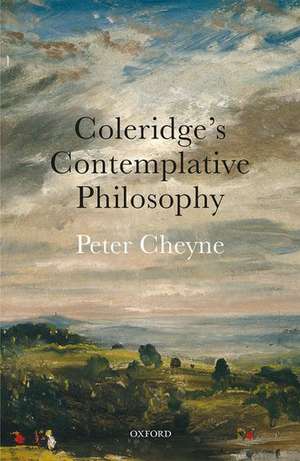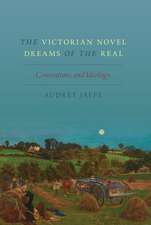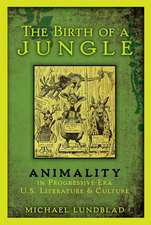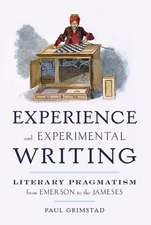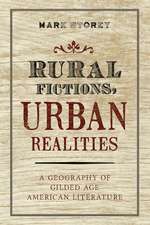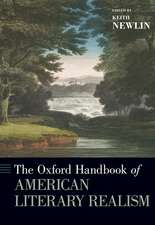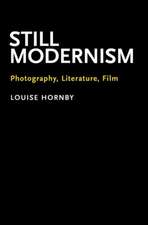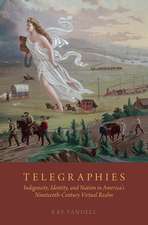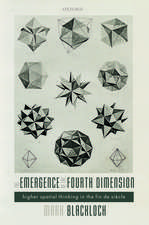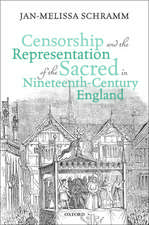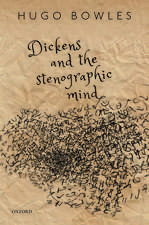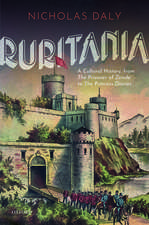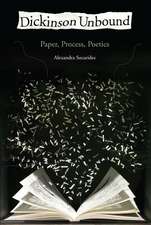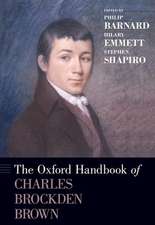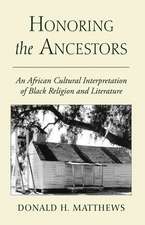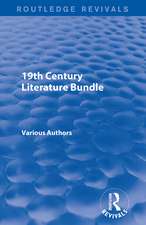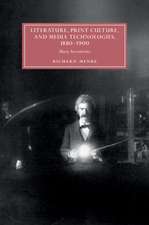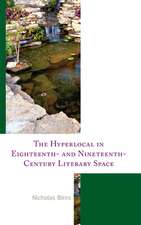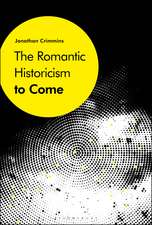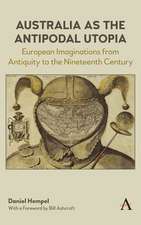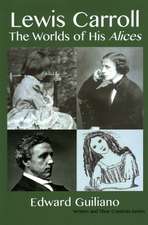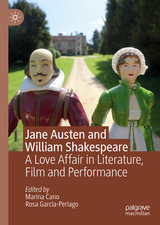Coleridge's Contemplative Philosophy
Autor Peter Cheyneen Limba Engleză Hardback – 24 ian 2020
Preț: 660.42 lei
Preț vechi: 818.25 lei
-19% Nou
Puncte Express: 991
Preț estimativ în valută:
126.37€ • 132.30$ • 104.56£
126.37€ • 132.30$ • 104.56£
Carte tipărită la comandă
Livrare economică 25-31 martie
Preluare comenzi: 021 569.72.76
Specificații
ISBN-13: 9780198851806
ISBN-10: 0198851804
Pagini: 394
Dimensiuni: 160 x 230 x 27 mm
Greutate: 0.72 kg
Editura: OUP OXFORD
Colecția OUP Oxford
Locul publicării:Oxford, United Kingdom
ISBN-10: 0198851804
Pagini: 394
Dimensiuni: 160 x 230 x 27 mm
Greutate: 0.72 kg
Editura: OUP OXFORD
Colecția OUP Oxford
Locul publicării:Oxford, United Kingdom
Recenzii
[Cheyne] is engaged in the process of returning to us a Coleridge that few of us come into contact with ... in his excellent book Coleridge's Contemplative Philosophy. Cheyne's truly impressive book makes substantial demands upon its readers, but this is to be expected given the far more extensive demands of the material it engages.... The result is a volume that stands out from what is often a superfluity of literature on Coleridge that confronts the reader who attempts to gain an understanding of his complex, yet fecund thought.
[S]eeks to provide a future direction for philosophy studies by re-examining, and creating a schema for, Coleridge's understanding of intuitive reason across his life and works. Cheyne ... show[s] the development of his philosophical ideals and how they came together to form his final philosophy of ideas in relation to contemplation....[C]hapter 11 deals directly with Coleridge's little-discussed 'Limbo' poems from 1811. Read in the light of Coleridge's 'metaphysics of ideas', these poems are used to showcase Coleridge's ability to move between translucent and transparent stages of contemplation.
Coleridge's Contemplative Philosophy is a smart and well-argued book, and it makes important contributions to diverse fields surrounding Coleridge studies. Chapters are rich with examples of ways Coleridge's thought emerges from classical antiquity, read through medieval mystical theology, and put into dialogue with some of the major thinkers of modern philosophy (particularly Kant, Schelling, and Hegel).
This book provides an extensive road map to many of the highways and byways Coleridge wandered down in both prose and poetry, and it does so without ever losing sight of the ultimate goal of the journey: a philosophy of contemplative ideas, an ideal-realism that brought together these many disparate influences. For Cheyne, Coleridge is a thinker of the first rank, whose achievement ... could have great value for the future direction of philosophy. ... [A] dazzling display of scholarship on Coleridge's ... poetic logic ... that facilitates noetic contemplation.
[C]omes closer than any other scholarly work... to examining... Coleridge's fifty-volume oeuvre in light of ... his classical, medieval, and modern sources... [D]espite incredible philosophical range, Coleridge's Contemplative Philosophy... is... free of jargon ... and Coleridge's thought suddenly appears clear and easy... [The] chapters discussing the sense... of beauty are themselves quite beautiful... [I]nterestingly reopens the question of the tenor of Coleridge's later political thought... [W]ill certainly be clarifying for Coleridge scholars and Romanticists. It will no doubt be important for those interested in the aesthetics of the everyday and nineteenth-century British philosophy as well.
[A] a remarkable gathering together of ... Coleridge's ... philosophy of the imagination, symbols, ideas, and reason....[A]nother strength of this book: it is simply enjoyable to read. Cheyne's prose is clear without sacrificing depth.... he lays out Coleridge's ideas with ease and skill.... [An] excellent contribution to Coleridgean scholarship. It is also a worthy read for anyone wishing to explore contemplative philosophy, Christian Platonism, and the intersection between the imagination, noetic reason, sacramentality, and everyday experience.
Cheyne combines precision in his accounts of Coleridge's meaning with a welcome breadth of mind that avoids rejoicing in Coleridge's presumed contradictions.
Out of a mass of material, scattered and hard to assimilate, Cheyne wrests a clear and comprehensive interpretation. It is a great achievement, an important book.
Coleridge's Contemplative Philosophy will appeal not only to literary scholars, but also to philosophers, theologians and intellectual historians alike, acting itself as an aid to reflection on the three designated periods of Coleridge's intellectual development. The scope of the study is both wide and comprehensive, demanding close and purposeful analysis in equal measure. However, the reward for this effort is an original and insightful study that has rightly given Coleridge his due, by situating him back in the upper echelons of Enlightenment philosophy.
a magnificent book that makes enormous intellectual demands upon its reader but will amply repay the closest scrutiny.... Cheyne now gives us the rich harvest of his study of Coleridge's way of thinking in a monograph which will stand out in the midst of the vast library of critical works on the subject...Coleridge ... explore[d] in remarkable detail and with philosophical precision, a way of thinking, a contemplative noetic, that Peter Cheyne reveals to those who are prepared to work with his very fine book. It is to be hoped that they are many who will do so .... We still have much to learn from Coleridge. Cheyne has proved a fine teacher in our schooling.
This erudite study shows that Coleridge made important contributions not only to literature and poetry but also to the history of English-speaking philosophy. Cheyne shows how Coleridge created a coherent philosophical system, 'ideal realism', which combines aspects of empiricism, Kantian and post-Kantian idealism, mysticism, and Platonism.
An analysis of Coleridge's philosophy by a professional philosopher that is new and extremely rewarding. It proceeds logically through adept phrasing and deft explanations, uncluttered by undue attention to positions Coleridge outgrew. Always sympathetic and succinct, it both illuminates and asks to be argued with at a commensurate high level of discussion.
Cheyne's discussion of Coleridge's modified Platonism is impressive both in the breadth of its erudition and depth of its interpretations
Comprehensive and evinces a deep knowledge and careful thinking-through--and it's beautifully written: always clear and elegant.
Peter Cheyne's book on Coleridg's Contemplative Philosophy confronts Coleridge's thought in the round. Evidence for what Coleridge means at any one time is drawn from all stages of his thinking.
Coleridge lived at a post-Kantian philosophical moment when it was claimed that any experience was something we could have an experience of... Peter Cheyne's book shows that Coleridge's ideas, ever proliferating, ever renewing the self he himself contemplated at so many different levels.
[S]eeks to provide a future direction for philosophy studies by re-examining, and creating a schema for, Coleridge's understanding of intuitive reason across his life and works. Cheyne ... show[s] the development of his philosophical ideals and how they came together to form his final philosophy of ideas in relation to contemplation....[C]hapter 11 deals directly with Coleridge's little-discussed 'Limbo' poems from 1811. Read in the light of Coleridge's 'metaphysics of ideas', these poems are used to showcase Coleridge's ability to move between translucent and transparent stages of contemplation.
Coleridge's Contemplative Philosophy is a smart and well-argued book, and it makes important contributions to diverse fields surrounding Coleridge studies. Chapters are rich with examples of ways Coleridge's thought emerges from classical antiquity, read through medieval mystical theology, and put into dialogue with some of the major thinkers of modern philosophy (particularly Kant, Schelling, and Hegel).
This book provides an extensive road map to many of the highways and byways Coleridge wandered down in both prose and poetry, and it does so without ever losing sight of the ultimate goal of the journey: a philosophy of contemplative ideas, an ideal-realism that brought together these many disparate influences. For Cheyne, Coleridge is a thinker of the first rank, whose achievement ... could have great value for the future direction of philosophy. ... [A] dazzling display of scholarship on Coleridge's ... poetic logic ... that facilitates noetic contemplation.
[C]omes closer than any other scholarly work... to examining... Coleridge's fifty-volume oeuvre in light of ... his classical, medieval, and modern sources... [D]espite incredible philosophical range, Coleridge's Contemplative Philosophy... is... free of jargon ... and Coleridge's thought suddenly appears clear and easy... [The] chapters discussing the sense... of beauty are themselves quite beautiful... [I]nterestingly reopens the question of the tenor of Coleridge's later political thought... [W]ill certainly be clarifying for Coleridge scholars and Romanticists. It will no doubt be important for those interested in the aesthetics of the everyday and nineteenth-century British philosophy as well.
[A] a remarkable gathering together of ... Coleridge's ... philosophy of the imagination, symbols, ideas, and reason....[A]nother strength of this book: it is simply enjoyable to read. Cheyne's prose is clear without sacrificing depth.... he lays out Coleridge's ideas with ease and skill.... [An] excellent contribution to Coleridgean scholarship. It is also a worthy read for anyone wishing to explore contemplative philosophy, Christian Platonism, and the intersection between the imagination, noetic reason, sacramentality, and everyday experience.
Cheyne combines precision in his accounts of Coleridge's meaning with a welcome breadth of mind that avoids rejoicing in Coleridge's presumed contradictions.
Out of a mass of material, scattered and hard to assimilate, Cheyne wrests a clear and comprehensive interpretation. It is a great achievement, an important book.
Coleridge's Contemplative Philosophy will appeal not only to literary scholars, but also to philosophers, theologians and intellectual historians alike, acting itself as an aid to reflection on the three designated periods of Coleridge's intellectual development. The scope of the study is both wide and comprehensive, demanding close and purposeful analysis in equal measure. However, the reward for this effort is an original and insightful study that has rightly given Coleridge his due, by situating him back in the upper echelons of Enlightenment philosophy.
a magnificent book that makes enormous intellectual demands upon its reader but will amply repay the closest scrutiny.... Cheyne now gives us the rich harvest of his study of Coleridge's way of thinking in a monograph which will stand out in the midst of the vast library of critical works on the subject...Coleridge ... explore[d] in remarkable detail and with philosophical precision, a way of thinking, a contemplative noetic, that Peter Cheyne reveals to those who are prepared to work with his very fine book. It is to be hoped that they are many who will do so .... We still have much to learn from Coleridge. Cheyne has proved a fine teacher in our schooling.
This erudite study shows that Coleridge made important contributions not only to literature and poetry but also to the history of English-speaking philosophy. Cheyne shows how Coleridge created a coherent philosophical system, 'ideal realism', which combines aspects of empiricism, Kantian and post-Kantian idealism, mysticism, and Platonism.
An analysis of Coleridge's philosophy by a professional philosopher that is new and extremely rewarding. It proceeds logically through adept phrasing and deft explanations, uncluttered by undue attention to positions Coleridge outgrew. Always sympathetic and succinct, it both illuminates and asks to be argued with at a commensurate high level of discussion.
Cheyne's discussion of Coleridge's modified Platonism is impressive both in the breadth of its erudition and depth of its interpretations
Comprehensive and evinces a deep knowledge and careful thinking-through--and it's beautifully written: always clear and elegant.
Peter Cheyne's book on Coleridg's Contemplative Philosophy confronts Coleridge's thought in the round. Evidence for what Coleridge means at any one time is drawn from all stages of his thinking.
Coleridge lived at a post-Kantian philosophical moment when it was claimed that any experience was something we could have an experience of... Peter Cheyne's book shows that Coleridge's ideas, ever proliferating, ever renewing the self he himself contemplated at so many different levels.
Notă biografică
Peter Cheyne is an Associate Professor at Shimane University and Visiting Fellow in Philosophy at Durham University. He is leading two international projects, one on Dynamic Philosophies of Life and Matter, 1650–1850, the other on Openness and Imperfection in Aesthetics and Ethics. He is editor of Coleridge and Contemplation (OUP, 2017) and co-editor (with Andy Hamilton and Max Paddison) of The Philosophy of Rhythm: Aesthetics, Music, Poetics (OUP, 2019).
